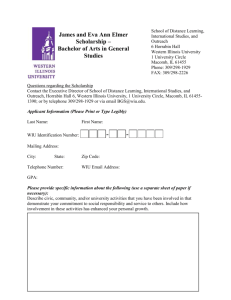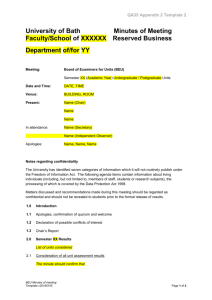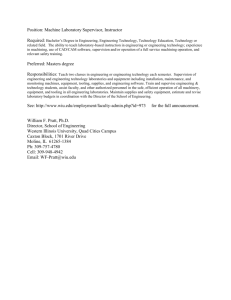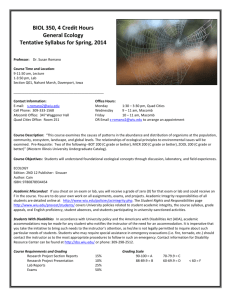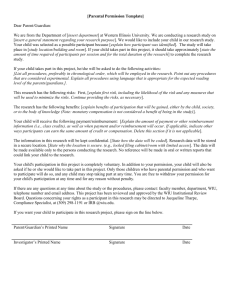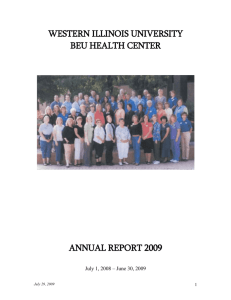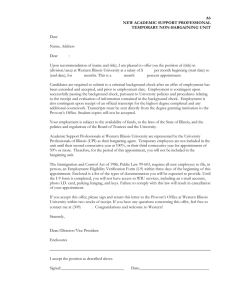Beu Health Center is an office within the
advertisement
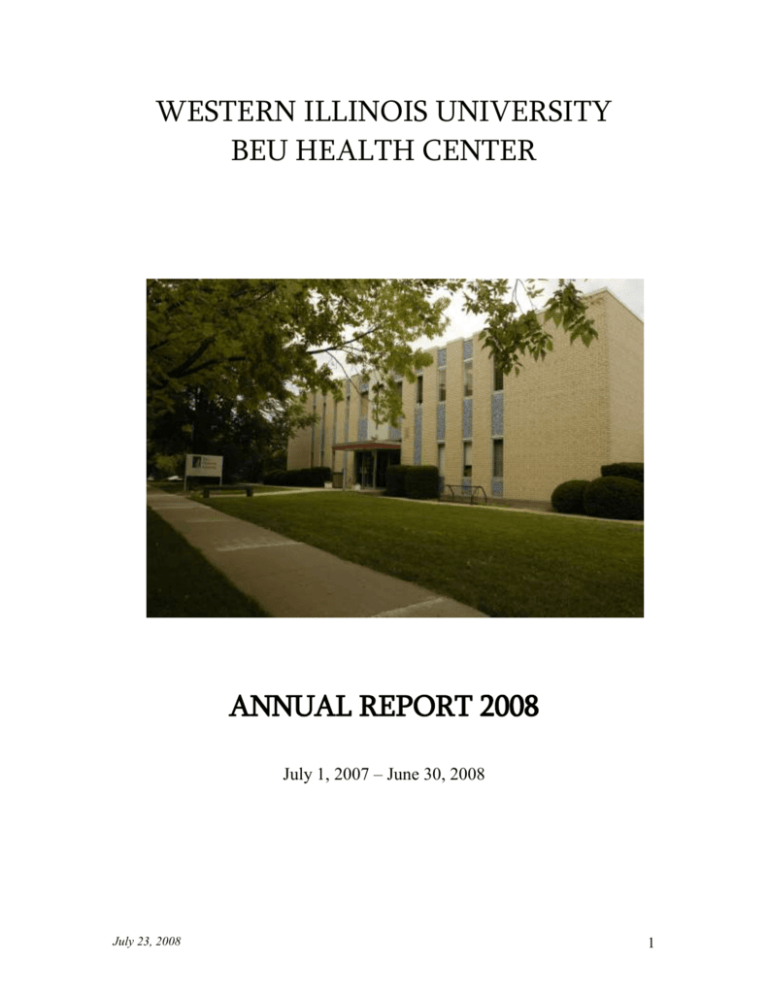
WESTERN ILLINOIS UNIVERSITY BEU HEALTH CENTER ANNUAL REPORT 2008 July 1, 2007 – June 30, 2008 July 23, 2008 1 Table of Contents Mission .................................................................................................... 3 Organization ............................................................................................ 3 Accreditation/Licensing .......................................................................... 3 Program Description ............................................................................... 4 Eligibility for Services ............................................................................ 4 Program Goals ........................................................................................ 4 Quality Management and Improvement ................................................. 5 Professional Development ...................................................................... 7 Student Learning and Development ....................................................... 7 University and Other Collaboratives ...................................................... 8 Administrative Highlights....................................................................... 9 Clinical Services Highlights ................................................................... 11 Ancillary Services Highlights ................................................................. 14 Health Education and Promotion Highlights .......................................... 16 Alcohol and Other Drug Center Highlights ............................................ 16 Student Insurance Administration Highlights ........................................ 17 Future Goals and Activities .................................................................... 18 Beu Health Center Statistics ................................................................... 21 Finances At-A-Glance ............................................................................ 23 July 23, 2008 2 Western Illinois University Division of Student Services Beu Health Center Annual Report FY 2008 MISSION The mission of Beu Health Center is to enhance the educational process of the university through assisting students in the modification or removal of health-related barriers to learning by providing appropriate medical services and collaborative programming. ORGANIZATION Beu Health Center is an office within the Division of Student Services of Western Illinois University. The Health Center Director is responsible for overall supervision and executive management of the health services activities and reports to the Vice-President for Student Services. The Medical Chief of Staff is an Illinois licensed physician and provides medical oversight for the health center, reporting to the Director. (See organizational chart). The Administrative Committee of the Health Center consists of the Health Center Director, Medical Chief of Staff, Assistant Director of Clinical Services, and Assistant Director of Marketing, Promotion, and AOD Center. This committee is responsible for the development and implementation of health center policy and procedure, as well as ensuring adherence to University policy and procedures. ACCREDITATION/LICENSING Beu Health Center has been nationally accredited since 1996 by the Accreditation Association for Ambulatory Health Care (www.AAAHC.org). This voluntary process provides an opportunity for the health center to measure its performance against national standards on quality health care. The next accreditation site visit is July 28 and 29, 2008 The Beu Alcohol and Other Drug Resource Center, located in Wetzel Hall, is licensed by the Illinois Department of Human Services to provide ASAM Level 1 Adult Outpatient treatment, Early Intervention, DUI Evaluation and DUI Risk Education. Services are accessible for students to minimize disruption of academic pursuits. A 3-year licensing renewal site visit was conducted in December of 2006 and indicated 100% compliance with state regulations. Our laboratory is a moderately complex laboratory certified to perform tests as required by the Clinical Laboratory Improvement Amendment of 1988 (CLIA). In addition the laboratory is accredited by COLA, a physician lead organization that evaluates excellence in laboratory medicine and patient care. A 3-year COLA re-accreditation site visit was conducted in April, 2008 with 100% compliance. July 23, 2008 3 The annual re-certification inspection of the radiology department by the Illinois Emergency Management Agency was conducted in October, 2007 with no deficiencies noted. The on-site pharmacy is licensed as an Illinois category V Retail Pharmacy, and has not been selected for inspection during FY 2007-08 by the Illinois Board of Pharmacy, however, licensure has been maintained per state regulations. Physicians, mid-level practitioners, nurses, and allied health professionals are licensed in Illinois and credentialed in their respective professions. . PROGRAM DESCRIPTION Beu Health Center offers general primary care services including the diagnosis and treatment of acute and chronic medical conditions; limited psychiatric assessment and treatment; Level 1 treatment for alcohol and other drugs; physicals, gynecological exams, immunizations, allergy desensitization, and referrals. Ancillary services include x-ray, laboratory, pharmacy and health education services. During FY 2007-08, approximately 39,000 visits were made to the Health Center. The Health Center administers a selfinsured accident and illness insurance program for eligible students, with approximately 7,000 students enrolled in the program. Services are provided 8:00 a.m.- 4:30 p.m. Monday through Friday by appointment. The Pharmacy is open from 8:00 a.m. – 12:00 a.m and 1:00 p.m. – 5:00 p.m. Monday – Friday. The Health Center is closed on University holidays or other days that the University is closed. After hours emergency care is available at McDonough District Hospital, an accredited trauma center located in Macomb, Illinois. Our web site, http://www.student.services.wiu.edu/beu/ provides additional information about our program. ELIGIBILITY FOR SERVICES All full and part-time students assessed the health center fee are eligible to use the health center, including Spoon River Community College students living in on-campus housing. Spouses or domestic partners of eligible students may also use the health center on a fee basis. Through a 1997 intergovernmental agreement with the Illinois Consortium of Student Health Programs, visiting students from member institutions that are eligible to utilize their school health services may receive services while visiting Western Illinois University. Emergency first aid is provided for all campus students, faculty, staff and visitors. PROGRAM GOALS GOAL 1: Beu Health Center will provide high-quality, cost-effective, health and preventative services for eligible individuals. July 23, 2008 4 GOAL 2: Beu Health Center will administer an Alcohol and Other Drug Resource Center providing ASAM Level 1 outpatient treatment. GOAL 3: Beu Health Center will develop and implement a comprehensive Health Education and Promotion plan that addresses health priorities and risk factors of the student population. GOAL 4: Beu Health Center will administer an affordable self-funded accident and illness insurance plan designed to insure appropriate access to health care for eligible students. GOAL 5: Beu Health Center will collaborate with university and community partners to engage students in programs that foster and reinforce wellness. (WIU Strategic Plan Goal*). QUALITY MANAGEMENT AND IMPROVEMENT PROGRAM The purpose of the Quality Management and Improvement (QMI) program is to ensure quality of care and to promote effective and efficient utilization of facilities and services of Beu Health Center. Although efforts are led by the QMI Team, Quality Management involves all aspects of the organization and is not regarded as the sole responsibility of a single group. The Quality Management and Improvement program integrates three major areas of quality management: 1) Maintaining a Peer Review Program, 2) Promoting a Quality Improvement program that incorporates Quality Improvement Studies and Performance Benchmarking; and 3) Conducting a Risk Management program in conjunction with University policies. Peer Review Peer review is an integral part of Beu Health Center ongoing Quality Management and Improvement process. It contributes to clinical audit and other activities such as professional development, information for credentialing and service planning and evaluation. Peer review focuses on two areas of evaluation: A) clinical outcomes review and B) provider review of patient visit/clinical records. The overall purpose of peer review is to inform others about one’s own practice in relation to that of the peer group. Peer review data is used as part of evaluating practitioner and allied health professional performance including the assignment of clinical privileges. During FY 2007-08, review of patient visit/clinical charts were conducted each quarter, with no serious deficiencies noted; individual concerns were shared with the practitioner involved. Health Care practitioners initiated case study/clinical outcome review (cases of concern, unusual diagnosis) as part of the quality improvement process. Quality Improvement Studies The Quality Improvement Program is a continual process designed to assess both the quality of service and the quality of care, or the degree to which health services for patients and the WIU population increase the likelihood of desired health outcomes and are consistent with current professional knowledge. The total operation of the health July 23, 2008 5 center is considered when assessing quality, and incorporates not only clinical aspects, but the administrative, fiscal, environmental and support services necessary to achieve a high quality services. During FY2008 there were 15 quality improvement studies completed as follows: Transcription Efficiency Study Medicaid Billing Study American Board of Internal Medicine Asthma Improvement Module Student Influenza Vaccination Utilization Department Organization Study Strep Culture Study Building Security Study Lab Image and Task Review Safety Sharps Devices Annual Evaluation Storage and Handling of Expired Pharmaceuticals Back Pain Management Study Cell-Dyn Comparison Study Review of Physician Dispensed Medication Annual Review of Policies and Procedures Insurance Coding Study – Billing Rejects Follow up studies were completed on: Staff Influenza Vaccination Rate – Follow up study Insurance Coding Study Follow-up – CPT Invalid Codes Patient Satisfaction Survey An annual patient satisfaction survey was conducted during Fall, 2007. Results indicated that students surveyed felt that Beu Health Center and its staff are well-regarded as an organization, but needs some improvements in terms of decreasing wait times for lobby and exam rooms and increasing efficiency in patient flow. Complete survey results are available upon request at Beu Health Center. A patient flow study will be conducted during Fall, 2008 to identify potential areas to improve efficiency. Benchmarking activities Numerous benchmarking activities conducted during FY 2008 provided opportunities to compare our performance with other populations and practices and included: Core Survey Benchmark Report July, 2007 National College Health Assessment Survey, Fall, 2007 ACHA Pap Test and STI Benchmark Survey Spring, 2008 ACHA National Benchmark Survey on College Health Facilities, May, 2008 ISCHP informal Surveys on psychiatric services, Accutane prescribing, credentialing/privileging, pharmacist salaries, staffing patterns and student fees. Live Free Smoke Free Universities Tobacco Survey U.S. Department of Education's Higher Education Center for Alcohol and Other Drug Abuse and Violence Prevention. Spring 2008 July 23, 2008 6 Risk Management Risk management activities included safety drills, incident management investigations, training, and regulatory and self-inspections. All incidents/unusual events were monitored for trends and corrective action taken where appropriate. PROFESSIONAL DEVELOPMENT Ongoing education is not only a required part of professional licensing, but is considered a critical part of staff development throughout the health center. During FY 2008, three full days were devoted to group staff development activities as well as monthly all-staff meetings throughout the academic year to keep staff informed of current issues affecting college health. Topics presented at group staff development included: Hand hygiene and MRSA Fire Safety training Workplace safety and security Team building Diversity training Bloodborne pathogens Lock-Down procedures Hostile patient de-escalation 7 Dimensions of Wellness Disabilities Awareness Cultural Competency Clinical staff received specialized in-service training in: Heart, Lung and Blood Institutes Asthma Treatment Guidelines Motivational Interviewing for Alcohol and Other Drugs Spirometry and Asthma Metered Dose Inhalers Glycomark autoimmune panels and thin prep pap imaging Vaccine-Preventable Disease Training Tuberculosis Screening CPR and ALCS Training Cervical Cancer Screening Individual staff members were provided professional development stipends to attend outside seminars and workshops and other continuing education opportunities (e.g. selfstudy courses) that were relevant to college health practice and organizational development. Some of the seminars attended this year were Illinois Consortia of Student Health Programs, Illinois Higher Education Center Annual Conference, DUI Provider Orientation, Illinois Communicable Disease Conference, Illinois Conference on Tuberculosis, CDC Regional Pandemic Influenza Planning, Mayo Clinic Symposium, AANP National Conference, Chicago Annual Conference on Complementary and Alternative Medicine, and the Psychiatric Congress Regional Conference. Numerous online and correspondence activities were completed. STUDENT LEARNING AND DEVELOPMENT Beu Health Center supports student learning and development in accordance with the WIU Strategic Plan. Our mission includes minimizing health related barriers to academic July 23, 2008 7 learning, which is accomplished through individual health counseling and the provision of population-based health programming. The health center also provides several opportunities for student skills and leadership development as follows: Students Talk Health Education 210 Certified Peer Educator Training: students were trained and received certification as Peer Educators through the BACCUS/GAMMA Network. 5 Student employees were employed in pharmacy (licensed pharmacy technicians), immunization compliance and AOD/health education. 4 Graduate students completed assistantships/internships in the Alcohol and Other Drug Center and Health Education. One international graduate student participating in the Edmund Muskie Fellowship program completed projects in epidemiology. 10 students from the WIU Kinesiology Department completed clinical rotation with Beu physicians. One physician-assistant student completed a preceptorship through a cooperative agreement between WIU and DeMoines University. Three medical assistant students and one radiation technician student completed clinical rotations at Beu through a cooperative agreement between WIU and Carl Sandburg Community College. UNIVERSITY AND OTHER COLLABORATIVES The health center staff participated in a variety of campus and other collaborative initiatives during FY 2008 including: Director Harris served on the WIU Institutional Review Board, WIU ADA Committee, WIU Emergency Consult Team, WIU Emergency Planning Committee, WIU Personal Safety Committee, Illinois Public Health Accreditation Project, McDonough County Oral Health Advisory Committee, McDonough County Pandemic Influenza Planning Committee Medical Chief of Staff Iverson served as president of the McDonough County Medical Society, Assistant Director Walton served on the Aggression Reduction Task Force and the Minority Health Month Committee. Administrative Nurse Birch served on the Sexual Assault Committee Staff Physician Karkare served as medical advisor for the Bella Hearst Diabetes Center, the McDonough District Hospital Diabetes Outreach Program and the McDonough County Tuberculosis Sanitarium Board. Health Education Coordinator Hairston-Jones served on the Women’s Center Advisory Board, and as president of the Illinois Society of Public Health Education Specialists Staff participated in the Big Pink Volleyball Tournament for the first time to raise money for the Susan G. Komen Foundation. July 23, 2008 8 ADMINISTRATION HIGHLIGHTS This year began with a reorganization of the health center along functional lines, thereby clarifying reporting lines, improving span of control for supervisors, and ensuring appropriate clinical supervision by licensure requirements. The Health Center continued to work with the Assistant to the WIU President for Governmental Relations to restore safety-net and university clinics' ability to access lowcost contraceptives. Although legislation has not passed this year, we will continue to address this issue in the effort to reduce unintended pregnancy. Much work has gone into preparations for re-accreditation through the Accreditation Association for Ambulatory Health Care (AAAHC). A core team has been appointed to assess our compliance through self-evaluation with the AAAHC standards. An on-site visit from AAAHC will take place July 28 and 29, 2008. Financial Summary The Health Center is a self-funded division of the Student Services Division in that it does not receive direct financial support from the University’s general revenue fund. Of the $2.7 million operating budget for FY 2008, 68% is derived from the student health center fee that is assessed with tuition for eligible students. Minimal fees are charged for office visits and medical procedures, laboratory tests, x-rays, prescription drugs and durable medical goods. State funding is limited to categorical funding for tobacco risk reduction. Indirect support is received through the University for numerous services including but not limited to building services, physical plant, payroll, accounting, IT, security and human resources. The Frank Beu Fund is a small foundation account available to the health center to offset services for students with a financial need. During 2007-08, a total of $3,344.00 was charged for transportation services for medical appointments, medical care and sexual assault medical services. The Health Center lacked a systematic internal process for budget development based on cost centers and revenue analysis. To remedy this situation, a budget development tool was developed in the fall of 2007. This tool allowed for an accurate projection of revenue and expenditures that resulted in: -1% variance between budgeted and actual revenue -6% variance between budgeted and actual expenditures An internal audit of Beu Health Center financial operation has not been performed in several years, although the University is moving toward that goal. This past year, a cashhandling survey was completed, pharmacy inventory audit and an on-site review of the credit card handling was performed as the first phase of the audit. July 23, 2008 9 A quality improvement study was undertaken to examine the Health Center’s participation in the Medicaid program, and its effect on the eligible student population. After analysis of the data, and consultation with the Vice-President of Student Services, a decision was made to stop participating in the Medicaid program, and to divert expenses associated with Medicaid eligible patients to the Frank Beu Foundation Account. After additional monitoring, the decision was made to refer Medicaid-eligible patients and their spouses to the newly opened Eagle View Community Health Clinic. These changes made HIPAA compliance no longer necessary, and prompted our return to FERPA and Illinois law as the standard for medical record privacy. Medical Records This was our second year of electronic health records, and staff became much more confident in using the system. A series of users’ group meetings and trainings were held to identify and solve technical problems. Transcription Writer application was implemented this year, and results have shown it to greatly improve the efficiency of transcription. Voice activated dictation software and digital transcription were evaluated but not implemented at this time. Practice Analytics, an application used to extract statistics from the electronic health data has proven to be invaluable in peer review and quality improvement. A system crash in October 2007 required that we revert to paper charting until the problem was resolved. This provided an opportunity to test our data recovery capabilities, and as a result, additional safeguards were put in place. Emergency Planning and Preparedness Beu Health Center has played an active role in emergency response and preparedness activities at WIU, and in the community. The health center is represented on the WIU Emergency Operations Planning Team, WIU Emergency Consultation Team, and the McDonough County Pandemic Planning committee. Staff have participated in local and regional tabletop exercises and the new Western Emergency Alert System. As the result of a credible campus threat this spring, new lockdown procedures have been instituted. July 23, 2008 10 CLINICAL SERVICES HIGHLIGHTS General Medicine The clinical staff includes physicians, a contracted psychiatrist, advance practice nurses, registered nurses, licensed practical nurses and medical assistants. During FY 2008, 20,904 patient visits were completed at Beu Health Center, slightly up from 2007 (20,535). Staffing presented a challenge this year, as two of our full-time physicians requested a part-time assignment. We were successful in recruiting Dr. Jack McPherson, a retiring family practitioner from Macomb, Illinois and Dr. Dominic Macaranas, internal medicine physician currently practicing in Macomb, to fill these slots. Cross training of nursing staff was a priority issue addressed this year to enhance competencies in critical areas. Registered nurses were provided cross training in the patient assistance program, nursing triage and immunization areas. Nurses were also rotated to work with different health care providers to improve efficiency and patient flow throughout the facility. The Health Center expanded collaboration with other institutions for clinical rotation/preceptorship experiences. Through an agreement with Carl Sandburg College, we hosted 3 Medical Assistant Students and a medical radiographer student during Fall 2007. A physician-assistant student completed a preceptorship through a cooperative agreement between WIU and DeMoines University. Asthma was identified as a priority health issue affecting WIU students. As part of our Asthma initiative, health care providers received training in the updated National Heart, Lung and Blood Institute Asthma 2007 Treatment Guidelines. An American Board of Internal Medicine Asthma study was conducted in September to measure patient improvement. Later, with the assistance of the Vice-President for Student Services, a spirometer was purchased for the health center to provide advanced diagnostic lung function testing. Training of clinical staff occurred in fall of 2007 and implementation of clinical testing during Spring 2008. Influenza surveillance for the Centers for Disease Control and Prevention continued during 2008. Through a simple card system, we have been able to report timely and accurate data, and monitor the influenza-like illness burden in our students. Our free influenza vaccination outreach campaign was extremely successful, with nearly 1,000 students vaccinated prior to the influenza season – a 400% increase over the previous year’s participation levels. Staff influenza vaccination rate of 78% exceeded the Healthy People 2010 national health objective of 60% by 18%, and the national baseline by 38% and is a key risk management initiative to combat the spread of influenza. An assessment of our Code Blue protocol was conducted by a physician led team as the result of an actual Code Blue event that occurred in March of 2008. Subsequent to the July 23, 2008 11 Code Blue assessment, updated protocols have been put in place and additional medications, cardiac monitor and laryngoscope have been added. Oxygen tanks are now staged on all three floors, and a new crash cart has been instituted. Physicians and nurses have been working over the summer to complete Advance Cardiac Life Support training at the local hospital. A physician led team has been working on the efficacy of a tuberculosis blood test, or Quantiferon Gold, for high risk students, instead of the traditional TB skin testing, which has a high incidence of false-positives. The McDonough County Tuberculosis Sanitarium Board has supported this Beu initiative, and implementation is expected in the Fall of 2008. A quicker turn around time, reduced false-positives and fewer chest x-rays are the expected benefits. The staff of Beu Health Center has continued to work collaboratively with the medical community including the McDonough District Hospital, McDonough County Health Department, Rural Health Centers and area physicians on issues affecting WIU and the community. These partnerships have included emergency/pandemic influenza planning, tuberculosis outreach and education, MRSA and communicable disease investigation, patient referrals, and the formation of a low-income dental center, the Eagle View Community Health Systems of McDonough County. The dental center opened its doors March 10, 2008, and serves all persons regardless of ability to pay, including WIU students. The center also added medical services, which will be an asset to many students with families in need of medical services as well as Medicaid/Medicare eligible student. Psychiatric Services In cooperation with the University Counseling Center (UCC) and McDonough District Hospital, we have continued to provide students with on-campus access to a psychiatrist. During 2008, we were able to schedule additional access days, increasing psychiatric care appointments by 18.8%. Beu and the UCC have worked together on several issues this year, including 1) involuntary psychiatric commitment protocol 2) streamlining patient referral process and 3) improving protocols for managing patients on psychotropic medication and psychotherapy compliance. A psychiatric services benchmark survey of Illinois universities was completed in December 2007 and confirmed that WIU is underresourced in this area. Strategies will be ongoing to enhance availability of psychiatric services. Beu Health Center has also funded the provision of “Freezeframe” software application for the UCC, and provided in-service training in its use for stress reduction. Other collaborations included National Depression Screening Day, E-Chug Day and the Ultimate Weight Solution. July 23, 2008 12 Immunization Compliance The compliance date for submitting immunization records was moved back one month to August 1, and January 1, respectively, for matriculating students. This allowed a more reasonable time frame to process records for the Illinois College Immunization Act compliance report, due the 8th week of classes. Last year, Electronic Student Services developed a database for tracking student immunization records; this year the back entry of active students was entered into the database. This system not only allows us to track immunizations, but to quickly identify non-immune students in the case of an outbreak of vaccine-preventable disease on campus, such as mumps or measles. A study conducted on the WIU Illinois College Immunization Compliance indicated that the percentage of immune WIU students (93.4%) exceeds the state universities’ benchmark (86%) as reported by the Illinois Department of Public Health. July 23, 2008 13 ANCILLARY SERVICES HIGHLIGHTS Laboratory Beu Health Center laboratory is a moderately complex laboratory accredited by COLA, a physician lead organization that evaluates excellence in laboratory medicine and patient care. An on-site accreditation visit this spring resulted in 100% compliance with COLA standards. Our laboratory received the COLA Laboratory Excellence Award, which is the organization's highest commendation. Our laboratory director is also our in-house EHR administrator. These additional duties have required an extra-help medical technologist to assist in the laboratory. This year marked the second phase of equipment upgrades for the laboratory. With financial support from the Vice-President of Student Services, the aging Cell-Dyn hematology analyzer was replaced with a newer model following a comparative study. An Olympus phase-contrast microscope was also added. Phase contrast will greatly improve visibility of low objective microscopy specifically for urine samples and vaginal wet prep samples. New technologies to be added to the laboratory menu for Fall 2009 include: Implementation of a new computer-based imaging technology with pap testing to increase sensitivity of gynecologic testing Implementation of new Quantiferon Gold TB testing for high risk students to improve the quality of a cost effective TB infection control program New technology for highly sensitive Chlamydia and Gonorrhea testing using strand displacement DNA technology in a 24 to 48 hour turn around time Pharmacy The on-site pharmacy is licensed as an Illinois category V Retail Pharmacy, and has not been selected for inspection during FY 2007-08 by the Illinois Board of Pharmacy, however, licensure has been maintained per state regulations. Prescriptions written by Beu health care providers may be filled at the on-site pharmacy or filled at outside pharmacies. We continue to fill prescriptions from outside physicians providing the medication is contained in our formulary. A new wholesale pharmaceutical vendor, DIK Drug, was selected from a competitive bid process during fall semester, 2007. The transition went fairly smoothly. Obtaining lowcost, high quality pharmaceuticals continues to be a top priority for the pharmacy. As the result of a quality improvement study, we began using a DEA-approved Reverse Distribution Vendor, for the disposal of legend drugs and controlled substances, some of which are considered hazardous materials. EXP Pharmaceuticals Inc. is in the final stages of Green Certification which aligns with WIU Core Values for sustainability. This program has proven to be a beneficial strategy for reducing liability and storage July 23, 2008 14 requirements for expired drugs, and has netted over $3000.00 in asset recovery. Future studies will include drug utilization and drug waste as part of a cost-containment strategy. A new law amending the Illinois Controlled Substances Act (720 ILCS 570) went into effect January 1, 2008, expanding the state’s monitoring of Controlled II prescription drugs to now include the reporting of prescription activity related to Schedule III-V controlled substances. Beu Health Center pharmacy was assisted by Electronic Student Services in developing a secure on-line protocol for the reporting process. Section 7002(b) of the U.S. Troop Readiness, Veteran’s Care, Katrina Recovery and Iraq Accountability Appropriations Act of 2007 required that all non-electronic Medicaid prescriptions be written on tamper-proof prescription pads, effective October 1, 2007. Although the health center does not fill Medicaid prescriptions, we reviewed our current practices to ensure compliance for hand-written prescriptions that may be filled at an outside pharmacy under the Illinois Medicaid program. A review of physician dispensed pharmaceuticals (drug samples, patient assistance program, pre-packaged drugs) was completed during spring semester, 2008 as part of our Risk Management program, with several changes in procedures made to improve dispensing practices. A label printer with specialized duplicate labels was added, as well as a revised sample log procedure. Radiology Routine diagnostic x-rays such as chest, spine and the extremities are provided on site in our radiology department. All films are read by a board certified radiologist contracted by the health center. Advanced imaging services are referred to outside facilities. The annual re-certification inspection of the radiology department by the Illinois Emergency Management Agency was conducted in October, 2007 with no deficiencies. We have studied the feasibility and technical requirements of upgrading our radiography equipment/technology to digital Computed Radiography, as well as integrating Picture Archiving and Communication System (PACS) technology into our electronic medical records system in FY 2009. A search is underway for an extra-help medical radiographer to restore 100% coverage to the department. July 23, 2008 15 HEALTH EDUCATION AND PROMOTION HIGHLIGHTS A health needs assessment was conducted this year to determine the top health priorities affecting our WIU student population. Data was collected from many sources, including the National College Health Assessment Survey, the Core Alcohol and Other Drug Survey, Beu practice data, Emergency room data and health insurance data. This information was then compiled and compared to reference data and Healthy Campus 2010 to create a Comprehensive Health Education and Promotion Plan for 2007-2010. The health priorities were determined to be 1) respiratory health 2) unintentional injuries and 3) sexual health. The Logic Model was used to map out intervention strategies to address the risk factors of each health priority. Students Talk peer education/Health Education 210 continues to train students as peer educators on campus and in the community. WIU continues to be a subcontracted campus in the Illinois Live Free, Tobacco Free! Grant. Funding from this grant provides tobacco cessation, increased awareness, and promotion of tobacco free living. Through this partnership, internationally known comedienne and lung cancer survivor Rene Hicks performed on campus in April. Beu Health Center supported the WIU campus and community in implementation of the Smoke-Free Illinois Act, which became effective January 1, 2008. Other campus collaborations included Minority Health Month and Heart Smart for Women. ALCOHOL AND OTHER DRUG CENTER HIGHLIGHTS This year marked the 5th year anniversary of the Beu Alcohol and Other Drug Resource Center, located in Wetzel Hall. The center is licensed by the Illinois Department of Human Services to provide ASAM Level 1 Adult Outpatient treatment, 0.05 Early Intervention, DUI Evaluation and DUI Risk Education and Prevention Services. Services are available for WIU students in order to minimize disruption of academic pursuits. Counselors Vivian Coeur and Amy Hofmeister were hired to replace founding staff members Amy Buwick (returned to UCC) and Pam Meyer (resigned from WIU to pursue education). Treatment groups were started during the Spring of 2007, and have proven to be a successful intervention strategy during 2008. An AOD Center marketing campaign was developed this year to promote the services of the center. The campaign includes AOD mousepads in the WIU Computer labs, a refrigerator magnet and informational brochures for students and parents. Thus far, funding for the campaign has been received from the WIU Substance Abuse Prevention Fund. Because alcohol is a campus and community wide issue, a proposal to address a comprehensive alcohol risk-reduction plan was submitted and approved by the WIU administration and has been included in the draft of the University’s updated Strategic Plan for 2008 –2010. AlcoholWise, a mandatory pre-matriculation education, will be the first component implemented for Fall, 2008. Beu Health Center will facilitate the July 23, 2008 16 development of this systematic effort to combat risky drinking within our campus community. STUDENT INSURANCE ADMINISTRATION HIGHLIGHTS This year was the 4th year of the self-insurance program. For the first three years, we were able to maintain the program at no increase in the premium. Due to increases in medical and administrative costs, the Board of Trustees approved a 14% premium increase in FY 2008. To date, the reserve fund has grown to nearly $1.5 million of the $3.0 million targeted for a reserve fund by the Board of Trustees. We entered into an expanded network agreement with our Preferred Provider Organization (PPO) to obtain additional discounts in northern Illinois for our students. A contract dispute between our PPO and the local hospital continued throughout the entire academic year, resolving at the 11th hour after months of negotiations, with no interruption in services. This agreement ensures that students may access the local hospital while obtaining the best discounts available. July 23, 2008 17 FUTURE GOALS AND ACTIVITIES GOAL 1: Beu Health Center will provide high-quality, cost-effective, health and preventative services for eligible individuals. Objective 1.1: Research options for renovation, expansion or re-location of student health services. (long-range) 1.1 Enhance privacy by soundproofing exam rooms (mid-range) 1.2 Enhance security by reconfiguring first floor lobby area to restrict access to clinical operations (mid-range) 1.3 Provide hand-sanitizer stations outside clinic rooms (short-range) 1.4 Implement electronic check-in capabilities to alleviate congestion in front lobby area (mid-range) 1.5 Relocate Student Insurance to front office area when paper charts are no longer needed on location (mid-range) 1.6 Investigate alternate storage for inactive medical records that must be retained for 10 years (short term) Objective 1.2: Increase psychiatric access for WIU students. (mid-range) Objective 1.3: Implement Computer Assisted Radiography and Picture Archiving and Communication System or PACS by September 30, 2008 (Strategic Plan Goal – technology) Objective 1.4: Restore 100% coverage for x-ray department by September 30, 2008 (short term) Objective 1.5: Provide ongoing quality improvement studies that address critical areas during 2008-2009 academic year: (short-term) 1.5.1: TB Gold blood test vs. TB skin testing positivity rates 1.5.2: Evaluation/Management Benchmarking Study with ISCHP Schools 1.5.3: Influenza vaccination rates for at-risk patients 1.5.4: Patient throughput study 1.5.5: Drug Utilization Study with ASHP Guidelines 1.5.6: Drug Waste Study with ASHP Guidelines 1.5.7: Follow up to Pain Management 2008 study, benchmarking with 2007 AAFP Low Back Pain Diagnosis and Treatment Guidelines 1.5.8: Pap and STI Study benchmarking with ACHA Survey 1.5.9: Health Center Utilization vs. patient enrolled hours 1.5.10 Radiology vs. physician interpretation of x-rays– patient outcomes 1.5.11 MRI utilization for athletic injuries Objective 1.6: Conduct a feasibility study on 3rd party billing as a strategy for revenue enhancement (mid-range) Objective 1.7: Implement electronic prescribing by May 30, 2009 (short-term) July 23, 2008 18 Objective 1.8: Achieve re-accreditation with AAAHC by August, 2008 (shortrange) GOAL 2: Beu Health Center will administer an Alcohol and Other Drug Resource Center providing ASAM level 1 outpatient treatment. Objective 2.1: Develop a plan to relocated AOD Resource Center with the Beu Health Center, upon expansion of existing health facility (long range) Objective 2.2: Develop a plan to relocate the AOD Resource Center when Wetzel Hall is taken off-line, expected date 2012. (mid-range) Objective 2.3: Participate in the Core Alcohol Survey by May, 2009 (Short-term) Objective 2.4: Evaluate (short term) the need for provision of ancillary services for at-risk students (mid-range) Objective 2.5: Assessment and referral out for clients who require more intensive, year-round services and support (short-term) Objective 2.6: Migrate to electronic appointment and record management system by Fall, 2008 (short-term) GOAL 3: Beu Health Center will develop and implement a comprehensive Health Education and Promotion plan that addresses health priorities and risk factors of the student population. Objective 3.1: Implement StudentHealth 101 Digital Magazine by September 1, 2008 for all students, faculty and staff (short term) Objective 3.2: Develop a comprehensive alcohol risk-reduction plan for WIU by January 2009 (short term) as part of the WIU Strategic Plan to meet or exceed national benchmarks in the Core Alcohol Survey by 2018 (long range). Objective 3.3: Implement Alcohol-Wise pre-matriculation education Fall, 2008 students (short range). Objective 3.4: Continue implementation and evaluation of 3-year Health Education and Evaluation Plan (mid-range) Objective 3.5: Implement “Ping My Health” link to Beu Health Center web site by August 30, 2008. (short term) July 23, 2008 19 GOAL 4: Beu Health Center will administer an affordable self-funded accident and illness insurance plan designed to insure appropriate access to health care for eligible students. Objective 4.1: Implement new Athletic Insurance contract through competitive bidding process that includes self-funded aggregate deductible options by August 1, 2008 (short term) Objective 4.2: Prepare rebidding for Third Party Administrator of Student Insurance Program by April 30, 2009 (short term) Objective 4.3: Increase insurance reserve by $100,000 by June 30, 2009 (short term) Objective 4.4: Develop an insurance primer for students that covers FAQs regarding student insurance by October, 2008 (short-term). Objective 4.5: Publish waiver requirements for web site by September 1, 2008 (short-term). GOAL 5: Beu Health Center will collaborate with university and community partners to engage students in programs that foster and reinforce wellness. (WIU Strategic Plan Goal). See also Objective 3.1 and 3.2 Objective 5.1: Collaborate with University partners (Student Activities, Student Recreation, Human Resources) to create a guided imagery room for stress management (mid-range). Objective 5.2: Collaborate with the University Theme Committee to develop activities for WIU ‘s 2008-2009 theme of Health and Wellness (short-term) Objective 5.3: Host Illinois Consortia of School Health Programs Spring, 2009 meeting (short-term) Objective 5.4: Enhance membership, activities and advocacy of the Student Health Advisory Committee (mid-range) July 23, 2008 20 SELECTED BEU HEALTH CENTER STATISTICS Practice Statistics Patient visits Procedures Prescriptions filled X-ray exams Laboratory – Total # patients Laboratory – CLIA test count AOD contacts Immunization compliance Flu shots administered Student Insurance Claims $ 2007-08 20,904 49,378 21,407 846 5652 21,125 1157 93.4% 1074 2,464,723.51* 2006-07 20,535 49,200 23,045 957 5592 21,445 1049 94% 294 $ 2,223,924.22 *annualized figure based on claims available as of May 30, 2008 Top Five Diagnostic Codes 2007 - 2008 2006-2007 Acute Upper Respiratory Infection 3,403 Acute Upper Respiratory Infection 3,422 Prophylactic Immunotherapy 2,417 Acute Sinusitis 2,327 Acute Sinusitus Acute Pharyngitis 2,073 1,948 Prophylactic Immunotherapy Routine GYN examination 1,888 1,764 Acute Tonsillitis 1,900 Acute Tonsillitis 1,662 July 23, 2008 21 Finances At-A-Glance Revenue Other Service Fees Other Medical Services Laboratory, X-ray Services Pharmacy Sales Interest Income Health Center Fee Expenses Other Expenses Administrative Support Medical Services and Contractual Medical Supplies and Commodities Salary and Wages July 23, 2008 22
